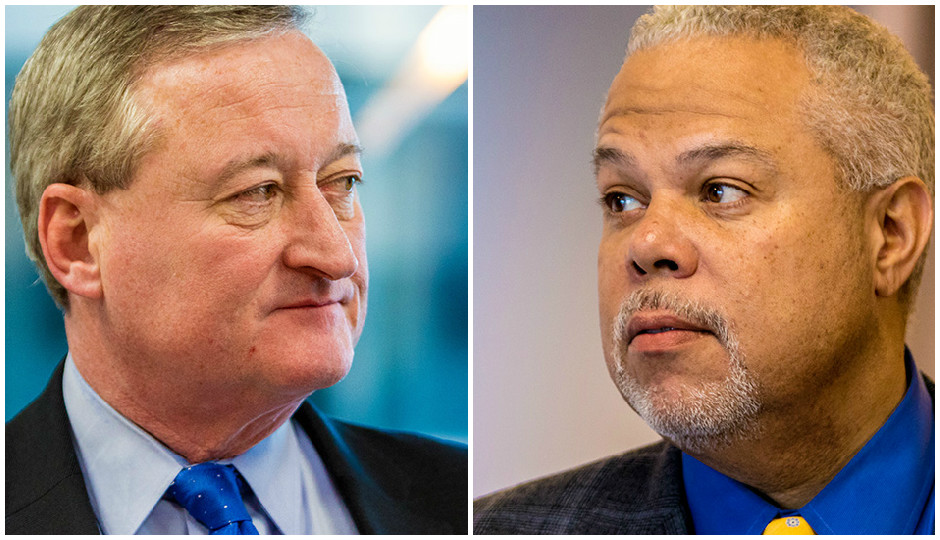The Brief: The Inquirer* Endorses Anthony Williams, Philly Mag Endorses Jim Kenney*

Photos by Jeff Fusco.
1. Philadelphia magazine’s editors endorsed the “New” Jim Kenney for mayor, while the Inquirer (or at least Inquirer editor Bill Marimow) chose Anthony Williams.
The gist: The magazine’s endorsement reads:
To a large extent, the fundamental question of the current election is this: If elected, which of the two Jim Kenneys would show up in the mayor’s office? The Jim Kenney who’d lead us forward? Or the Jim Kenney who’d send us careening backwards to the bad old days of city government?
Frustratingly, the last few months haven’t really given us a definitive answer. Indeed, in many ways we’ve gotten the campaign we feared we’d get — largely uninspiring, devoid of big visions, creative ideas and concrete solutions to Philadelphia’s biggest problems. (It says something that the most crafted and thought-through plan for school funding has come from a non-candidate, Sam Katz, who’s only likely to jump into the race if Tony Williams wins the Democratic primary and Katz can mount a credible charge as an independent.)
Still, Jim Kenney has shown enough in this campaign to make us believe that of the candidates before us, he’s the best choice….
Jim Kenney feels right for this moment — a man who can continue Philadelphia’s transformation from old to new because he himself has transformed from old to new.
And the Inquirer’s nod to Williams reads:
For two men representing different facets of the city – the passionate Irish Catholic son of a firefighter from East Passyunk; the even-keeled son of an African American politician from Cobbs Creek – they are a remarkably close match. But the balance of power in City Hall isn’t so close. Because the unions backing Kenney already wield too much influence, The Inquirer’s choice for the Democratic nomination is Anthony Williams.
There’s some important backstory to the Inquirer’s endorsement. Even before the Inquirer’s endorsement was published, rumors were swirling that the paper’s owner and publisher, H.F. “Gerry” Lenfest” — who has contributed $2,900, the max permitted under city law, to a Williams PAC — would play a role in the endorsement. On Saturday, Dave Davies at Newsworks reported that the Inquirer’s editorial board “reached a consensus to endorse Kenney.” So how did the paper end up endorsing Williams? Inquirer editor Bill Marimow told Davies that he made the call to pick Williams, not Lenfest. Writes Davies:
“The decision was mine, and Gerry had nothing to do with it,” Marimow said in a phone interview yesterday.
Marimow recalled that Lenfest decided that neither the Inquirer norDaily News would endorse in the governor’s race last fall, a move that drew criticism because Lenfest had been a major contributor to incumbent Republican Gov. Tom Corbett.
“I talked with him at length about the board’s desire to endorse in the mayor’s race,” Marimow told me. “I said I would participate, and I did.”
Why it matters: The new conventional wisdom is that media endorsements don’t matter much at all. Fewer readers are picking up newspapers and magazines, and those that do are less inclined now than in the past to defer to the judgement of anonymous editorial boards or editors. And that’s true enough. The real value of a media endorsement is in the role it can play in campaign ads. Most people who hear the Inquirer has endorsed Williams will never read the editorial itself (same for the magazine’s endorsement of Kenney), rather they’ll see a line quoted in a TV ad. That has real value. And one way to tell it has value is to look at how keen the campaigns are to snag the endorsement, and how upset Kenney supporters are at the Inquirer’s endorsement process.
Will the controversy over the Inquirer endorsement diminish its value for Williams? Probably not. It’s a very, very small slice of voters who are going to learn about how the Inquirer chose Williams, and most of those voters were probably inclined not to vote for Williams in the first place.
2. What’s up in the overwrought Ori Feibush versus Kenyatta Johnson race?
The gist: Writing for the Inky, Tricia L. Nadolny has a nice look at the broader dynamics in Philadelphia’s Second Council District, which are making the race that much more intense.
In a town marked by stale City Council contests, Philadelphia’s Second District race is anything but.
It pits Feibush, a suburban-raised developer who says he’s emptied his bank account to fund his campaign, against Kenyatta Johnson, a freshman councilman with Democratic-organization backing.
The epicenter is Point Breeze, where Johnson was born, where Feibush built his business, where both live, and where their divergent approaches to development clash.
The tensions there echo those in other rapidly changing parts of the city where wealthier, mostly white residents have moved into poorer African American communities. Feibush, fairly or not, has become the face of gentrification; Johnson is a product of the community.
“I’m just not sure the conflict is rooted in the two candidates,” said Joe Corrigan, a political consultant who lives in the neighborhood. “I think it’s rooted in a much larger conversation about race and development.”
Why it matters: The piece does a nice job of capturing and explaining the tensions in the district, which in many ways probably offer a preview of the political and cultural scuffles to come as Center City continues to expand.
3. The Nutter administration wants to spend $22 million on new voting machines. City Council, not so much.
The gist: The city’s proposed capital budget includes $22 million for new voting machines to replace the aging models now used in Philadelphia, reports Tom MacDonald for Newsworks. But Council President Darrell Clarke says he’d rather use the money on other capital needs: “I’m not feeling the $22 million request.”
Why it matters: It seems clear Philadelphia needs new machines, and needs them soon. The 2016 presidential election isn’t far off.